

Johann Jakob Ebert (20 November 1737 to 18 March 1805) was an 18th-century German mathematician, astronomer, poet and author.


Johann Jakob Ebert (20 November 1737 to 18 March 1805) was an 18th-century German mathematician, astronomer, poet and author.

Johann Jakob Ebert was born in Breslau, Prussia (today known as Wrocław, Poland). He was educated in Wurzen in western Saxony. He returned to his hometown to study at the Elisabeth Gymnasium. [1]
In 1756 he enrolled at the University of Leipzig in Saxony to study Mathematics, Natural Philosophy (Physics) and Moral Philosophy. He graduated MA in 1761. Following his graduation, he lectured in Maths and Philosophy at the university. He worked with Christian Gellert and Johann August Ernesti.
In 1764 he began a grand tour of Germany and France. After his tour of Germany and France, he went to Russia in 1768 where he accepted a post as tutor to the children of Minister Teplof in St. Petersburg. In 1769 he went to the University of Wittenberg in Saxony as a junior professor of Lower Mathematics. He quickly obtained a reputation as a competent teacher. [2]
From 1771 he published newspapers and periodicals in Wittenberg.
In June 1783, during a visit to Paris, he became the first German to fly in a hot air balloon. He met the Montgolfier Brothers on the same occasion. On his return to Wittenberg, the subject of aviation became part of his lectures. In 1785 he became professor of both Lower and Higher Mathematics at the University. [3]
In 1789 he built an observatory at his house at 16 Burgermeisterstrasse in Wittenberg. [4]
He died in Wittenberg on 18 March 1805.

Dugald Stewart was a Scottish philosopher and mathematician. Today regarded as one of the most important figures of the later Scottish Enlightenment, he was renowned as a populariser of the work of Francis Hutcheson and of Adam Smith. Trained in mathematics, medicine and philosophy, his lectures at the University of Edinburgh were widely disseminated by his many influential students. In 1783 he was a joint founder of the Royal Society of Edinburgh. In most contemporary documents he is referred to as Prof Dougal Stewart.

Jakob Friedrich Fries was a German post-Kantian philosopher and mathematician.

Johann Gottfried Gruber was a German critic and literary historian.

Johann Daniel Titius was a German astronomer and a professor at Wittenberg.

Johann Beckmann (1739–1811) was a German scientific author and coiner of the word technology, to mean the science of trades. He was the first man to teach technology and write about it as an academic subject.

Abraham Gotthelf Kästner was a German mathematician and epigrammatist.

John Robison FRSE was a British physicist and mathematician. He was a professor of natural philosophy at the University of Edinburgh.

Karl Christian von Langsdorf, also known as Carl Christian von Langsdorff, was a German mathematician, geologist, natural scientist and engineer.

Johann Lucas Boër, originally Johann Lucas Boogers was a German medical doctor and obstetrician.

Georg Christian Knapp was a German Protestant theologian.
Johann Ernst Fabri was a German geographer and statistician.
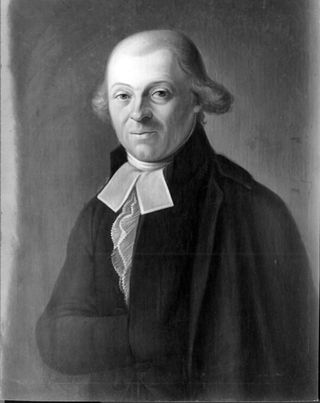
Johann Friedrich Flatt was a German Protestant theologian and philosopher.
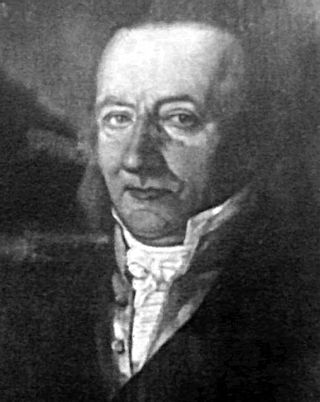
Jacob Struve was a German mathematician and father of the astronomer Friedrich Georg Wilhelm von Struve.
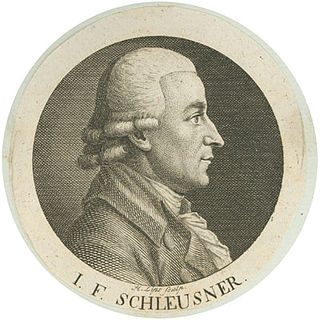
Johann Friedrich Schleusner was a German Protestant theologian. He was considered one of the more prominent German theological scholars of his time.

Martin Luther University Halle-Wittenberg, also referred to as MLU, is a public research university in the cities of Halle and Wittenberg. It is the largest and oldest university in the German state of Saxony-Anhalt. MLU offers German and international (English) courses leading to academic degrees such as BA, BSc, MA, MSc, doctoral degrees, and Habilitation.
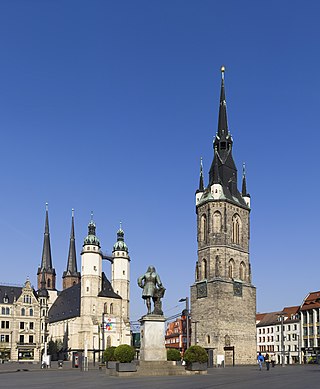
The Marktkirche Unser Lieben Frauen is a church in the centre of the city of Halle, Saxony-Anhalt, Germany. It was built between 1529 and 1554 and is the most recent of the city's medieval churches. In German, its official name is shortened to Liebfrauenkirche but it is also referred to as Marienkirche and the Marktkirche.
Christian Gottfried Schütz was a German classical scholar and humanist, known for his contributions in philosophy and philology, and for his work as an academic and literary editor and publisher.
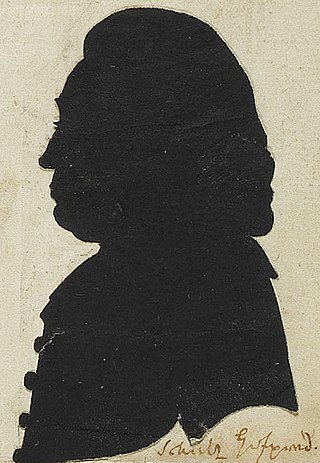
Johann Friedrich Schultz, also known as Johann Schultz, was a German Enlightenment Protestant theologian, mathematician and philosopher. He is best known as a close personal friend and trusted expositor of Immanuel Kant. Johann Schultz was a Hofprediger and Professor of Mathematics at the University of Königsberg.

Aegidius Strauch was a German mathematician and theologian.
Johann Christoph Muhrbeck was a Swedish Pomeranian philosopher.